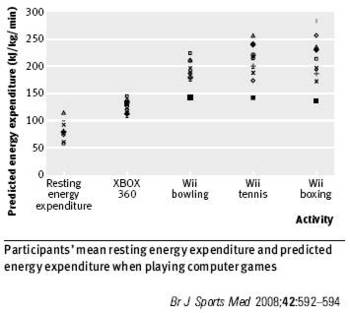
Readers of this blog know that I think of Wii as fun, not therapy. In the spirit of fairness, I must acknowledge that there might be a patient population which could benefit from gaming in rehabilitation.
Checking in with a GUEST POST(the first ever guest post on NPA Think Tank!) is Stacy Fritz, PT, PHD, Clinical Assistant Professor of Physical Therapy at the University of South Carolina, who explains her research interest in Wiihab:
"Recent research has focused on identifying innovative and cost effective rehabilitative strategies to enhance function and quality of life in aging and/or neurologically compromised adults. Virtual reality (VR) gaming may provide an ideal opportunity for motor learning and the recovery of lost function.1 First, the system allows for repetitive practice of activities, sometimes without the assistance of a rehabilitation specialist. Second, it has built-in augmented feedback, and the interactive interface helps to maintains participant interest and motivation. Third, the system may be an affordable option for many individuals.2
Research suggests that people with disabilities are capable of learning movement skills in virtual environments. Specifically, movements learned in a virtual environment transfer to real-world equivalent motor tasks; in some instances, evidence suggests that learning in a virtual environment has some advantages over real environment rehabilitation.1 Such findings paint an optimistic portrait for the future of VR in the treatment of balance and mobility deficits. To date, however, there is limited research that supports the use of VR in the treatment of balance and mobility deficits.3
The popularity of commercially-available gaming systems, such as Nintendo’s Wii, is extending beyond the teen gaming set. The systems are fast becoming an integral part of rehabilitation. Numerous news reports suggest that usual physical therapy such as stretching and/or lifting exercises can be “painful, repetitive and downright boring.” To avoid the “boring” therapy, therapists have been using gaming systems that involve interaction between the person and the video system through body actions that are similar to traditional therapy exercises. While there is considerable anecdotal evidence, as well as high utilization of gaming systems by hospitals, there has been limited research to indicate whether or not using virtual reality is effective for improving balance.
Supporters of the use of VR in a physical rehabilitation environment argue that it provides a non-threatening, fun, and motivating experience. However, there are concerns regarding the use of VR in individuals with physical limitations, including patient attitudes toward technology, equipment safety, feasibility of use, and lack of individualization of therapy. Despite these concerns, VR has been shown to be beneficial for a variety of populations.2,4,5
Anyone who has ever played the Wii, can not deny that it is fun, engaging, and many games are physically active. But is it appropriate for rehabilitation? The research needs to be done, this includes feasibility, efficacy, and determination if there is a need for a skilled therapist? Maybe it will be a good complement or adjunct to other falls prevention programs. Most important, it needs to be investigated before Wii Rehab centers start turning virtual reality into reality."
Thanks, Stacy!
Click on for references.
Continue reading “Wii Fun vs. Wii Funded”







